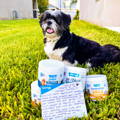My Dog Has Diarrhea But Is Acting Fine—What Should I Do?
Vet Verified
WRITTEN BY DR. JOYA GRIFFIN
Jump to Section

My dog has diarrhea but is acting fine––what gives?
It can be distressing to see our four-legged companions experiencing digestive issues. When your dog's demeanor remains upbeat despite diarrhea, it can be confusing––should you worry, or just ignore the symptoms?
We’ll cover the nuances of dog diarrhea, explore potential causes, discuss why your dog might be acting fine despite the issue, and offer guidance on managing this common problem.
Introduction to dog diarrhea
Diarrhea is a prevalent concern among dog owners and can range from mild to severe. Diarrhea isn’t considered healthy dog poop. These abnormal stools can range from near-liquid in consistency with little-to-no definition to mushier stools with ragged, irregular edges.
It's important to understand that occasional bouts of diarrhea aren’t uncommon in dogs, and may resolve on their own. However, persistent or severe diarrhea warrants attention and potential veterinary intervention.
Understanding diarrhea in dogs
To help pet parents understand dog diarrhea and why it happens, you’ll first need to consider frequency, symptoms, and more.
Types of Diarrhea: Acute and Chronic
My dog has diarrhea, but what kind? Diarrhea can manifest in two primary forms: acute and chronic. Acute diarrhea occurs suddenly and often resolves within a few days, while chronic diarrhea persists for an extended period indicating underlying health issues.
Recognizing Different Symptoms
My dog has soft stool but is acting fine––should I be worried? It's crucial to pay attention to accompanying symptoms. These may include increased frequency of bowel movements, changes in stool consistency, blood or mucus in the stool, black/tarry stools, vomiting, lethargy, and loss of appetite.

Potential causes of diarrhea in dogs
Dietary Changes and Sensitivities
Abrupt changes in diet, introduction of new foods, or dietary indiscretion (such as scavenging garbage) can trigger digestive upset in dogs. Additionally, food intolerances or allergies may lead to diarrhea.
Environmental and Stress Factors
Stress, anxiety, or changes in the environment can disrupt your dog's digestive system, resulting in diarrhea. Common stressors include moving to a new home, loud noises, separation anxiety, or the addition of a new pet.
Other Health Conditions
Bacterial, viral, or parasitic infections, such as parvovirus, giardiasis, or roundworms, can cause diarrhea in dogs. These infections often require veterinary treatment to resolve effectively.
Infections and Parasites
Underlying health conditions, such as impacted anal glands, inflammatory bowel disease (IBD), pancreatitis, or cancer, may manifest with diarrhea as a symptom. These conditions necessitate thorough evaluation and management by a veterinarian, especially if the issue is chronic.
Why does my dog have diarrhea but is acting fine?
It’s natural to have questions if your dog’s gastrointestinal behaviors seem a little out of whack. Your thoughts might be, “my puppy has diarrhea but is acting fine,” or “why is my adult dog acting normal despite having loose stool?” Dogs are resilient creatures and may not always display outward signs of discomfort, even when experiencing diarrhea, which could leave you second-guessing if they’re actually experiencing a medical issue.
If you do notice abnormal stools that last more than a couple days, it’s a good idea to contact your veterinarian for a discussion or clinical evaluation.
Managing diarrhea at home
Home care, with guidance from your veterinarian, can be a great option for managing your dog’s diarrhea symptoms.
Importance of Veterinary Consultation
“My dog has diarrhea but is acting fine––there’s no need to see the vet.” That might be true, if it’s for 24 hours or less. On the flip side, no matter how your canine is behaving, there’s always a chance diarrhea could signal a serious medical issue.
Consulting your veterinarian is crucial, especially if the diarrhea persists for more than a day or is accompanied by other concerning symptoms such as vomiting, lethargy, and lack of appetite. Your vet can perform a thorough examination, recommend diagnostic tests if necessary, and prescribe appropriate treatment.
Dietary Adjustments and Home Care
In many cases, dietary adjustments can help alleviate diarrhea in dogs. Your veterinarian may suggest feeding a bland diet consisting of boiled chicken and rice or a commercial prescription diet formulated for digestive health. Avoid feeding table scraps or high-fat foods, as these can exacerbate gastrointestinal upset.
Hydration and Monitoring
Keeping your dog hydrated is essential, especially if diarrhea is accompanied by vomiting or reluctance to drink. Offer fresh water frequently to replenish lost fluids. Monitor your dog's condition closely, noting any changes in appetite, energy levels, or stool consistency.
Introduce Fiber
Offering canine fiber supplements may help bulk up your dog’s stools if they’re on the looser side. Boosting dietary fiber can also be helpful for dog’s struggling with anal gland impaction. Adding fiber isn’t a cure-all: you should still discuss chronically loose stools with your veterinarian.
Hygiene
Diarrhea is a messy affair, so be sure to keep hygienic rear-end wipes on-hand. Dogs with fluffy tails, long hair, and puppies especially will benefit from a quick clean-up after they’ve passed a loose stool.
When to seek professional help
If your dog’s diarrhea lasts longer than 24 hours–even if they’re behaving normally or in good spirits–contact your veterinarian. The longer your dog has diarrhea, the higher their risk of developing dehydration, anal gland impaction, and other more serious complications.
Identifying serious symptoms
While my dog has soft stool but is acting fine may not seem alarming initially, certain symptoms warrant immediate veterinary attention. These include:
- Persistent diarrhea lasting more than 24 hours
- Blood in the stool
- Dark tarry or black stool
- Vomiting
- Lethargy or weakness
- Loss of appetite
- Abdominal pain or bloating
Treatment options and recovery
Upon seeking professional help, your veterinarian will conduct a thorough evaluation to determine the underlying cause of the diarrhea.
Treatment options may include medication to address infections or inflammation, dietary modifications, and supportive care to alleviate symptoms. With prompt intervention, most cases of diarrhea in dogs can be successfully treated, leading to a full recovery.
Conclusion: ensuring your dog's health
If your dog has diarrhea but is acting fine, it can be a perplexing situation for pet owners. While your dog's cheerful demeanor may be reassuring, it's important to address gastrointestinal issues quickly to prevent complications and ensure your dog's well-being.
So how do you prevent dog diarrhea in the first place?
- Keep human food and trash out of reach of your furry friend to avoid accidental ingestion, which can lead to gastrointestinal upset.
- Feed a consistent, well-balanced diet and avoid frequent dietary changes.
- Avoid high fat treats to help prevent indigestion.
- Monitor your dog when they’re playing with toys to make sure they don’t ingest them.
By understanding the potential causes of diarrhea, seeking veterinary guidance when needed, and providing appropriate home care, you can help your furry friend overcome digestive upset and enjoy a happy, healthy life. Remember, your veterinarian is your ally in promoting your dog's health and happiness!
Join the Pack!

Sign up for exclusive deals, curated pet tips from veterinarians, and product launches!
Pet Parents are Also Reading
November, 2023
December, 2023
October, 2023
January, 2024
Written By a Vetnique Vet

Dr. Joya Griffin, DVM, DACVD
Dr. Griffin is an expert in veterinary dermatology, with a focus on helping pets and their parents cope with fungal and immune-related skin diseases. She’s also the star of the Nat Geo WILD television series, “Pop Goes the Vet with Dr. Joya.”
Sign up for exclusive deals, curated pet tips from veterinarians, and product launches!
























